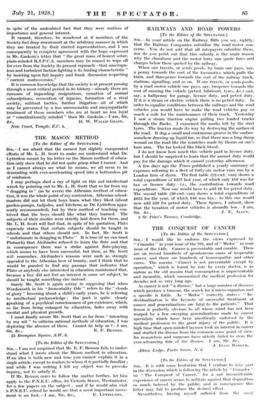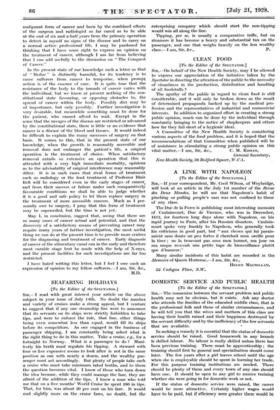[To the Editor of the SPECTATOR.] SIR, —It is with some
hesitation that I venture to take part in the discussion which is following the article by " Crusader " on " The Conquest of Cancer," for a not inconsiderable experience of cancer seems to militate against that dogmatism so much beloved by the public, and in consequence this letter may' fail to produce the desired 'effect.
Nevertheless, having myself suffered from • the most
malignant form of cancer and been by, the combined efforts of the surgeon and radiologist so far cured as to be able at the end of six and a-half years from the primary operation to detect in myself no signs of the disease and to carry on a normal active professional life, I may be pardoned for
• thinking that I have some right to express an opinion on the treatment of cancer, although I am far from believing that I can add usefully to the discussion on " The Conquest of Cancer."
In the present state of our knowledge such a letter as that of " Medoc " is distinctly harmful, for its tendency is to cause sufferers from cancer to temporize, when prompt action is of the essence of cure. It is quite true that the resistance of the body to the inroads of cancer varies with the individual, but we know at present nothing of the con- stitutional state favouring, or opposing obstacles to, the spread of cancer within the body. Possibly diet may be of importance, but only possibly. Further investigation is very desirable, but meanwhile something must be done for the patient, who cannot afford to wait. Except in the sense that the ravages of the disease are restricted or advanced by the constitutional state, there is little or no evidence that cancer is a disease of the blood and tissues. It would indeed be difficult to explain the many successes of surgery on that basis. It comes to this, that in the present state of our knowledge, when the growth is reasonably accessible and removal does not endanger the patient's life, a surgical operation is the treatment of choice. When satisfactory removal entails so extensive an operation that this is attended with a very high immediate mortality, opinions as to the advisability of surgical interference may reasonably differ. It is in such cases that rival forms of treatment such as radiology or the lead treatment of Professor Blair Bell will be considered even in the early stages of cancer, and from their success or failure under such comparatively favourable conditions we shall be able to judge whether it is a good and safe policy to let them replace surgery in the treatment of more accessible cancers. Much as I per- sonally owe to surgery, I pray that this form of treatment may be superseded, but the time is not yet.
May I, in conclusion, suggest that, seeing that there are so many cases of cancer actual and potential, and that the discovery of a satisfactory means of preventing cancer may require many years of further investigation, the most useful thing we can do at the present time is to provide more centres for the diagnosing and treatment of cancer. Early diagnosis of cancer of the alimentary canal can in the early and therefore most curable stage best be made with the help of X-rays, and the present facilities for such investigations are far too restricted.
I have hated writing this letter, but I feel I owe such an expression of opinion to my fellow sufferers.—I am, Sir, &c., M.D.





















































 Previous page
Previous page